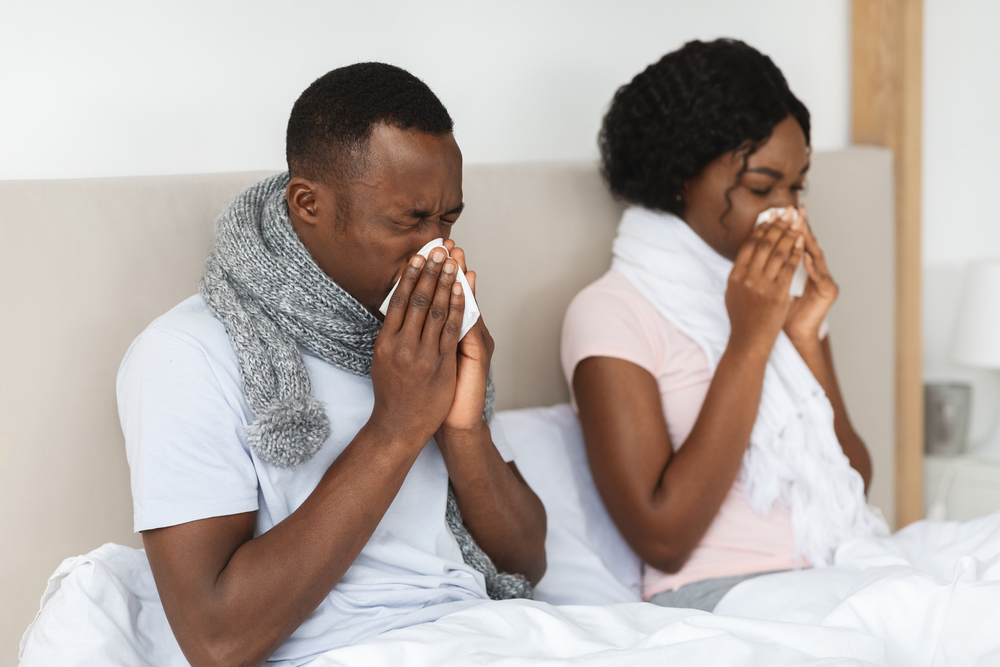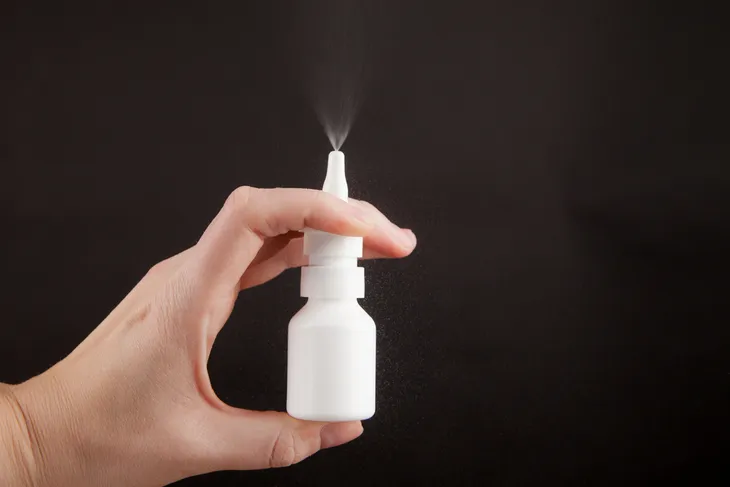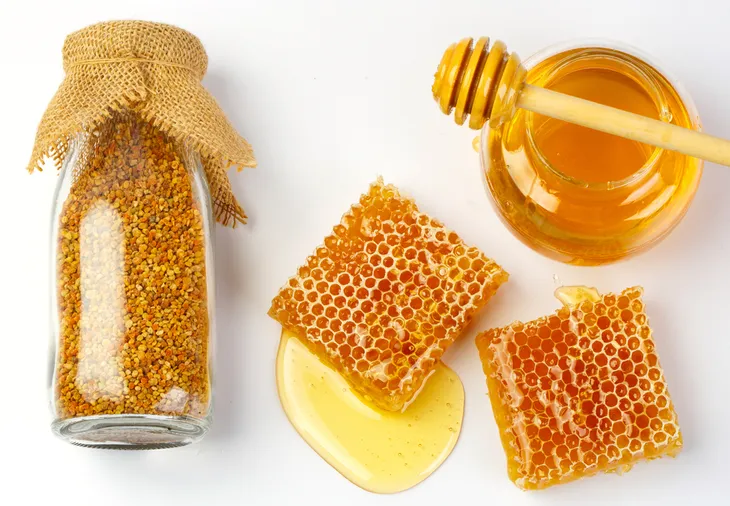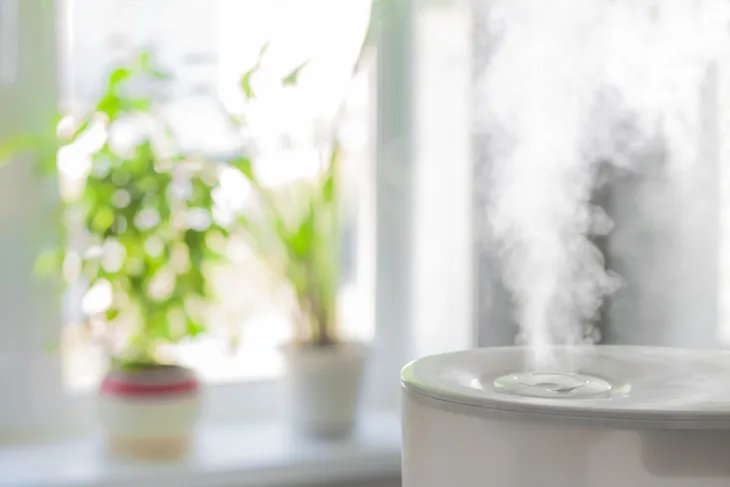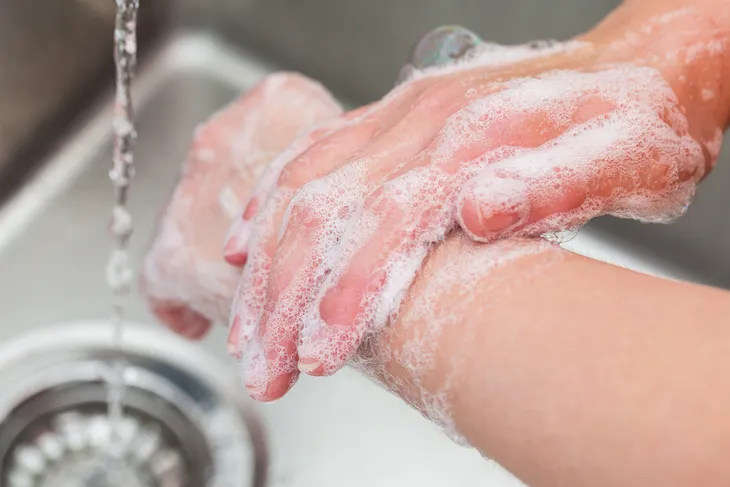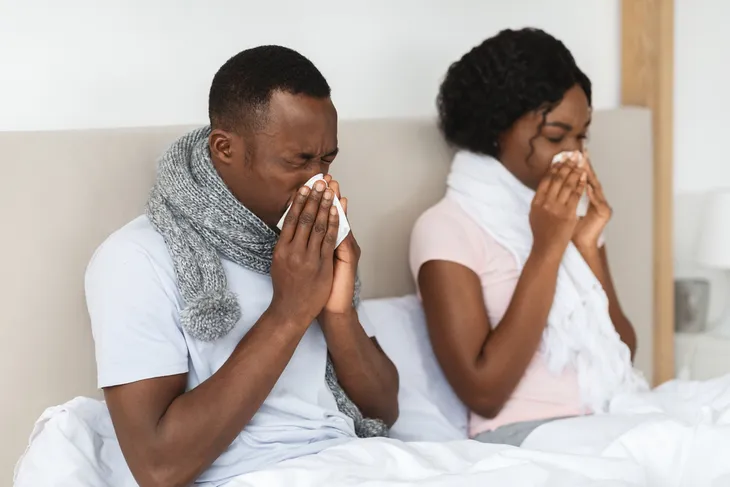- There may not be a cure for the common cold but there are a lot of things you can do to help get rid of it fast such as drinking lots of fluids and getting plenty of rest.
- A saltwater gargle, vitamin C, honey, echinacea, nasal spray, humidifier, and over-the-counter cold and flu medication may also help you get over a cold.
- Some lifestyle adjustments like washing your hands regularly, eating a healthy diet, and engaging in regular exercise may help prevent a cold in the first place.
Fatigue, congestion, a sore throat, and a nasty cough. We all know that colds happen, but we’re also always caught off guard when they do. Maybe it’s been a while since you’ve had a cold. Maybe you’re hoping to stock up on supplies; if you do, you’re never altogether hopeless in the face of illness. In fact, there are a variety of things you can take and do that may help get rid of a cold fast.
Drink Lots of Fluids
Modern medicine agrees that staying hydrated is one of the best things we can do for colds. You don’t have to stick to water either. Tea, chicken broth, and juice work wonders for your hydration. Fluids may help loosen congestion too, which can be a big deal.
Conversely, you’ll want to stay away from any liquids that might dehydrate you. Yes, sadly, that means anything with caffeine and alcohol.
Get Lots of Rest
Don’t just take my word for it. The Centers for Disease Control (CDC) recommends getting extra rest when fighting off a cold too.
There might not be an outright cure for the common cold but getting a lot of rest helps your body devote more of its energy stores to fighting the virus. Rest means getting a lot of sleep and avoiding any strenuous physical or mental activity while you’re still symptomatic.
Saltwater Gargle
You likely have access to table salt and warm water, which is what makes this at-home salty concoction such a staple. But don’t get it twisted. Saltwater gargles aren’t popular because they’re cheap and accessible. They work.
The practice is an effective way of pulling out a lot of fluid from the tissue of the throat area, which effectively washes the virus out. It’s not going to cure what ails you outright, but it can dull painful symptoms effectively.
Stock up on Vitamin C
Vitamin C, a potent source of antioxidants, can serve as a topical treatment for wrinkles, and may even prevent the development of stress-related diseases. Vitamin C is mostly known for its ability to protect against and shorten the duration of the common cold.
The good news is vitamin C is available anywhere you get your other cold supplies. This makes the recommended 6 to 8-gram daily dosage easy to find and afford.
Nasal Spray
Many common cold veterans swear by nasal sprays or drops. That’s because they’re often incredibly effective at clearing blockages. But be wary, using the wrong one for too long may make your symptoms worse.
Saline nasal sprays and drops can be bought without a prescription and can be used as often as you’d like. Certain decongestants should never be used for longer than 3-days at a time, or your symptoms may come back even worse. Don’t be afraid to ask your pharmacist for clarification either. That’s what they’re there for.
Honey
If a cough is keeping you up at night or if your scratchy throat is beginning to be unbearable, dissolve a spoonful of honey in some hot tea for some relief. More than just delicious, honey has been shown to positively impact nocturnal coughs and sleep quality in children with cold-like symptoms.
It turns out honey also has tons of other benefits for your health. It can be good for heart health, may lower blood pressure, improve cholesterol, aid digestion, and more. All the more reason to give this easy and accessible remedy a try!
Echinacea
There are conflicting views on the efficacy of echinacea’s impact on common colds, but it pops up on just about every at-home cold remedy list so we thought it deserved some discussion time here too.
Many people and some studies claim that taking echinacea can prevent the onset of a cold or shorten the duration of one that’s already in full swing. However, it can interact with other drugs you may be taking, so don’t take it without talking to your doctor first.
Use a Humidifier to Add Moisture
There are a lot of reasons to invest in and regularly maintain an at-home humidifier. They can limit the spread of airborne illnesses, help ward off future illnesses, and help you breathe better.
If you do have a cold, the soothing moisture associated with an active humidifier can effectively ease your airways, moisturize your nasal, throat, and lung passages, and help you recover faster.
Over-The-Counter Pain Relievers
Some colds can be brutal. With physical aches, sinus headaches, and sore throats working overtime to keep you in bed. Thankfully a lot of the most popular over-the-counter (OTC) pain relievers are indeed effective in the event of illness.
All three including ibuprofen, acetaminophen, and aspirin are capable of reducing fevers and pain. Just make sure you read the label and follow the dosage instructions exactly.
Over-The-Counter Cold and Cough Medications
Anyone over the age of 5 can safely turn to over-the-counter cold and cough medications for relief of their symptoms. Things like cough suppressants and antihistamines may not shorten the duration of your cold but can help alleviate symptoms.
As with anything over the counter, it’s critical that you follow the dosage instructions on the back of the box to the letter. If at all unclear, call your doctor or ask your pharmacist.
Cold Prevention Tips
There may not be a cure for the common cold but there are a lot of things that otherwise healthy people can do to help lower their risk of getting one. For starters, wash your hands often and avoid touching your face, especially when you’re out in public. It’s also a good idea to keep household surfaces as clean as possible to prevent spreading bacteria and viruses.
Further, maintaining a healthy lifestyle by eating a healthy diet and engaging in regular exercise can help support your immune system and may help prevent a cold.
Finally, if you smoke, it’s time to quit. Amesh A. Adalja, MD, a board-certified infectious disease physician at the University of Pittsburgh tells Prevention, “Symptoms often linger in those who are smokers.” Individuals who smoke are also more susceptible to sickness compared to individuals who don’t smoke because nicotine and tobacco damage the tissue in your lungs, ultimately making you more prone to infections. If you need help quitting, talk to your doctor.
The Takeaway
Enduring a cold is about more than just knowing what to do. Maintaining an adequate supply of cold-fighting meds, pre-packaged soups, or the various ingredients required to make some from scratch is critical to your recovery. You can’t get much rest when you’re running around town getting supplies, and you probably shouldn’t be spreading your sickness either.
Hopefully, this article finds you in good health but if it doesn’t, don’t forget to drink a lot of fluids, get as much rest as possible, and be prepared to ride it out like you used to back in grade school.
